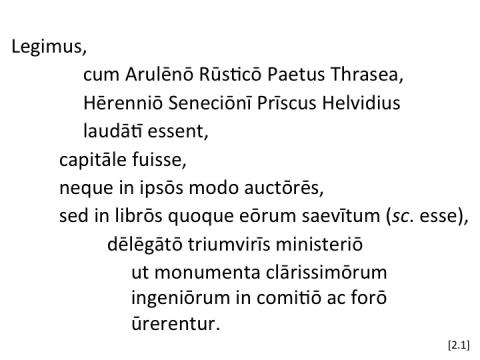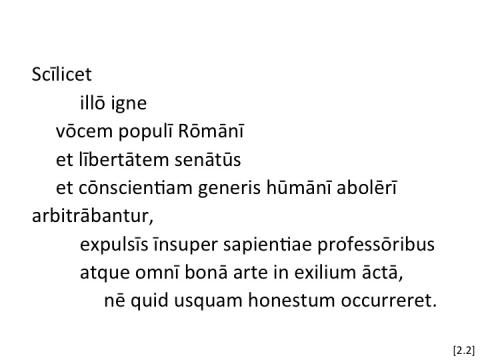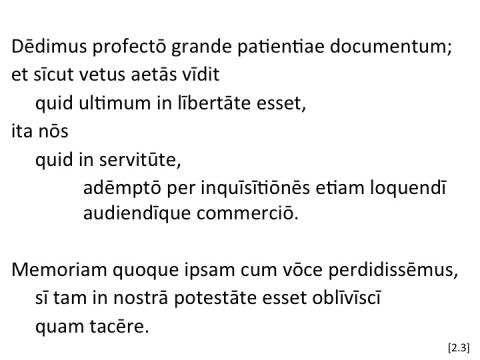[2.1] Legimus, cum Arulēnō Rūsticō Paetus Thrasea, Hērenniō Seneciōnī Prīscus Helvidius laudātī essent, capitāle fuisse, neque in ipsōs modo auctōrēs, sed in librōs quoque eōrum saevītum, dēlēgātō triumvirīs ministeriō ut monumenta clārissimōrum ingeniōrum in comitiō ac forō ūrerentur. [2.2] Scīlicet illō igne vōcem populī Rōmānī et lībertātem senātūs et cōnscientiam generis hūmānī abolērī arbitrābantur, expulsīs īnsuper sapientiae professōribus atque omnī bonā arte in exilium āctā, nē quid usquam honestum occurreret. [2.3] Dedimus profectō grande patientiae documentum; et sīcut vetus aetās vīdit quid ultimum in lībertāte esset, ita nōs quid in servitūte, adēmptō per inquīsītiōnēs etiam loquendī audiendīque commerciō. Memoriam quoque ipsam cum vōce perdidissēmus, sī tam in nostrā potestāte esset oblīvīscī quam tacēre.
notes
Overview: Domitian's antipathy to goodness was illustrated specifically by the execution of certain biographers and the destruction of their books; likewise by the expulsion of the philosophers. We submitted, but we cannot forget (Stuart)
2.1
legimus: probably in the acta diurna, a gazette, officially inspired, in which were published the news of the City, gossip of the court, and such records of public business as the emperor chose to disseminate. Domitian evidently made an example of these two cases, so that a report of the penalty inflicted and the names of the culprits would certainly be published in the acta, although this was not his invariable practice .... Legimus is present; the plural includes the contemporary public. (Stuart); i.e. in the official acta senatus, so that there was no reason for doubting what might otherwise have seemed incredible. (Gudeman); can be read as legimus (present) or lēgimus (perfect). For discussion see Woodman ad loc. (Lahiri)
Arulēnō Rūsticō: the name is inverted; note the similar usage in Paetus Thrasea and Priscus Helvidius. Junius Rusticus Arulenus was an older contemporary of Tacitus, and a member of a Stoic coterie that offered determined opposition to Domitian. ... Aruleno is dative; Tacitus uses this case freely with forms of the passive verb where Cicero would write a or ab with the ablative. (Stuart) [A&G 375]; for the "dative of the agent," see 10.2 Gallīs ... inspicitur. (Pearce); L. Junius Rusticus Arulenus, a distinguished Stoic of the time of Nero, was executed by Domitian in 94 CE for writing the biography here mentioned, in which he spoke of Thrasea and Helvidius as sanctissimi viri. The transposition of the cognomen, still rare in pre-Augustan Latin, is particularly frequent in Tacitus. (Gudeman)
Paetus Thrasea: Thrasea Paetus, a senator of lofty character, who was condemned to death in the time of Nero because of his refusal to support measures which were designed to flatter the emperor. (Stuart); P. Clodius Thrasea Paetus, also a Stoic. As the outspoken leader of the opposition he incurred the displeasure of Nero, and was finally driven to suicide by a trumped-up charge of treason in 66 CE. See Ann. 16.21 ff. (Gudeman)
Hērenniō Seneciōnī: Herennius Senecio .... The biography here mentioned was written at the request of Fannia, the wife of Helvidius Priscus. (Stuart); an intimate friend of the younger Pliny, who was associated with him in the trial of Baebius Massa, probably shortly after Agricola's death in 93. He was subsequently denounced by the notorious informer, Mettius Carus (see ch. 45.1), for writing the life of Helvidius, and was executed; but his work was rescued from the flames (to which it had been consigned by a decree of the senate) by Fannia, the wife of Helvidius, who concealed a copy. (Gudeman)
Prīscus Helvidius: Helvidius Priscus, son-in-law of Thrasea Paetus. He was an uncompromising opponent of the imperial power; was banished by Nero, but recalled by Galba. He incurred the displeasure of Vespasian by indulging in outspoken criticism and deliberate affronts, was sent into exile a second time, and soon afterwards was put to death. (Stuart); banished in 66 CE, restored in 70 CE. ... Notice that when the praenomen is omitted, the cognomen can come before the nomen. (Pearce); praetor 70 CE. Later he incurred the displeasure of Vespasian by his uncompromising opposition and was finally executed in 73 CE. (Gudeman)
fuisse: the subject is the fact mentioned in the last clause. (Pearce)
saevītum: sc. esse. (Gudeman); "wrath was vented." (Stuart)
triumvirīs: the so-called trēsvirī capitalēs. (Stuart); sc. capitalibus, the official executioners. The delegation of the duty of burning condemned books to these functionaries instead of to the aediles was intended as an additional degradation. The earliest recorded instance of this practice is the burning of the alleged books of Numa in 181 BCE. ... The biographies mentioned by Tacitus were the last so dealt with, the inefficacy of the proceeding having gradually become apparent. (Gudeman)
in comitiō ac forō: the comitium was a space lying north west of the Forum and in front of the Senate house. In imperial times it had lost the special significance it had once possessed as the original assembly-ground of Rome and had been merged in the Forum. The books were therefore to be burned, in one place, in the public center of Rome; the formula in comitio ac foro is designed to emphasize this fact. (Stuart); the comitium, a part of the Forum, near the Senate House, was the scene of public punishments. (Pearce)
2.2
scīlicet: ironical. (Stuart)
cōnscientiam generis hūmānī: "the power of mankind to remember." (Stuart) cōnscientiam: “the verdict of the civilized world,” as we might say. The word means “the knowledge of the facts of the case.” (Pearce); Domitian in his shortsightedness imagined he could prevent men from retaining a vivid knowledge of these events. See Tac. Ann. 4.35.5, praesentī potentiā crēdunt extinguī posse etiam sequentis aevī memoriam. (Gudeman)
arbitrābantur: sc. Domitian and his ministers. (Pearce)
expulsīs īnsuper sapientiae professōribus: the ablative absolute does not precede the main verb in point of time, but joins an additional fact; sapientiae professōribus = philosophīs. (Stuart) [A&G 420.5]; this took place in 93 CE. sapientiae, for philosophiae. Tacitus whimsically avoids, as far as possible, Greek expressions. ... Tacitus is fond of closing a period with an ablative absolute. See Introd. p. xxvii #6, and on the chiasmus, ibid. p. xxviii #12. (Gudeman)
atque: is epexegetic of the preceding clause, i.e. "and by so doing he banished every worthy accomplishment." This high praise of philosophy does not represent T's personal convictions, for it strangely contrasts with ch. 4.3 (where see note). It seems here to be due to a desire to stigmatize an act of Domitian at any price, for Vespasian, styled by Tacitus patientissimus verī, had previously issued a similar decree. (Gudeman)
omnī bonā arte: “all ennobling pursuits;” used abstractly for the persons who engaged in them. Compare chapter 1.1, virtus. (Stuart); “all learning.” ars bona is used sometimes of moral qualities, sometimes of an intellectual accomplishment (as probably here). (Pearce)
nē quid … honestum occurreret: Tacitus, as we should expect, puts the worst possible construction on Domitian's motives. As a political expedient there is something to be said for the banishment of the philosophers. Many of them had rendered themselves obnoxious by their defiance of existing orders of things, social, political, and religious. (Stuart); a rhetorical embellishment. The measure was of course felt by Domitian to be a political necessity. (Pearce)
2.3
Dēdimus profectō: the asseverative particle is generally omitted in Tacitus, when the verb is placed at the beginning. See Introd. p. xxvi, #3. (Gudeman)
vetus aetās: i.e. the Republican period. This use of vetus is characteristic of Tacitus. (Gudeman)
ultimum: "extremes"; a disparaging allusion to the lawlessness of the late Republic. Although Tacitus theoretically regarded the vetus aetās as the high-water mark of Roman greatness and virtue (see chapter 1.2), he was not blind to the drawbacks of democratic government. (Stuart) ultimum in lībertāte: "liberty carried to extremes"; not intended by Tacitus to denote a desirable state of things. He is thinking of the anarchy of the civil wars. (Pearce)
nōs: sc. vidimus. So ultimum after quid, and esset after servitūte are supplied from the preceding by an easy ellipsis. (Gudeman)
quid: sc. ultimum. (Pearce)
adēmptō ... commerciō: refers to the nefarious practice of informers, so frequently denounced by Tacitus, e.g. Ann. 4.30.3, delatores, genus hominum publico exitio repertum. (Gudeman)
per inquīsītiōnēs: by the surveillance exercised by the delatores or professional informers who were especially active in the last part of Domitian's reign. See chapter 45. (Stuart)
loquendī audiendīque commerciō: Pliny complains that the informers were "highwaymen" who plied their trade not "in lonely places, nor on the road, but in the forums and the temples." (Stuart)
vocabulary
Arulēnus –ī m.: L. Junius Rusticus Arulenus
Rūsticus –ī m.: Rusticus
Paetus –ī m.: Thrasea Paetus
Thrasea –ae m.: Thrasea
Herennius –iī m.: Herennius Senecio
Senecio –ōnis m.: Senecio
Priscus –ī m.: Helvidius Priscus
Helvidius –ī m.: Helvidius
capitālis capitale: punishable by death
saeviō saevīre saeviī saevitum: (with in) treat with cruelty, be brutal to
dēlēgō –lēgāre: to assign
triumvir -ī m.: commission (of three) responsible for executions, tresviri capitales
ministerium –ī n.: service, task
monumentum monumentī n.: memorial
Comitium Comitī(ī) n.: Comitium
ūrō ūrere ussī ustum: to burn
Rōmānus –a –um: Roman
cōnscientia cōnscientiae f.: consciousness, knowledge, conscience
aboleō abolēre abolēvī abolitus: destroy
expellō expellere expulī expulsus: to expel, banish
īnsuper: further, moreover
professōr professōris m.: teacher, professor
quis quid after si, nisi, ne, or num: anyone, anything
usquam: anywhere
profectō: assuredly
grandis grandis grande: great, large, fine
patientia patientiae f.: submission, patience, long-suffering
documentum –ī n.: example, instance, lesson
servitūs servitūtis f.: slavery
adimō adimere adēmī adēmptus: to take away
inquīsītiō inquīsītiōnis f.: espionage
commercium –iī n.: trade, interchange, commercial dealings
oblīvīscor oblīvīscī oblītus sum: to forget



